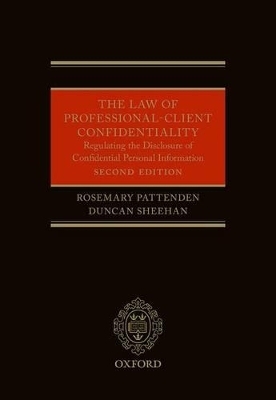
The Law of Professional-Client Confidentiality 2e
Regulating the Disclosure of Confidential Information
Seiten
2016
|
2nd Revised edition
Oxford University Press (Verlag)
978-0-19-966951-6 (ISBN)
Oxford University Press (Verlag)
978-0-19-966951-6 (ISBN)
The new edition of the comprehensive practitioner guide to disclosure and withholding of confidential information, drawing together many areas of law to provide detailed guidance on issues and solutions.
This book examines the disclosure and withholding of all forms of confidential information handled by professionals. Fully revised and updated, the new edition examines the numerous recent developments in the law, particularly following revelations by the media of the interception of professional confidences by phone hacking and other means. Its primary focus is on the law of England and Wales, but it includes insights from the secondary literature and case law of Australia, Canada, Ireland, New Zealand, and Scotland. This allows it to predict how English courts may fill gaps in the law, and makes it a useful resource for practitioners in other common law jurisdictions.
The book begins with a discussion of the basic principles of confidentiality, including types of confidential information, confidentiality obligations, disclosures, and confidentiality obligation. Part I examines the legal instruments for the enforcement of confidentiality, including contractual obligations, tort of misuse of private information, equitable wrongs, actions against third parties, civil remedies and criminal offences, and remedies beyond the courts. Part II discusses justified disclosure, including those relating to public interest, official investigations, administration of justice, consent and waiver, and lapsed confidentiality. Part III analyses the grounds for justified non-disclosure, including legal professional privilege, public interest immunity, contractual or equitable obligations, data protection and freedom of information, privacy protection, and non-disclosure to client. Finally, Part IV discusses limiting the extent of a lawful disclosure, dealing with circulation restrictions, public reporting, anonymity, court attendance restrictions, and collateral use.
This is an essential reference for those advising either the professional or the individual client on issues relating to the disclosure of confidential personal information.
This book examines the disclosure and withholding of all forms of confidential information handled by professionals. Fully revised and updated, the new edition examines the numerous recent developments in the law, particularly following revelations by the media of the interception of professional confidences by phone hacking and other means. Its primary focus is on the law of England and Wales, but it includes insights from the secondary literature and case law of Australia, Canada, Ireland, New Zealand, and Scotland. This allows it to predict how English courts may fill gaps in the law, and makes it a useful resource for practitioners in other common law jurisdictions.
The book begins with a discussion of the basic principles of confidentiality, including types of confidential information, confidentiality obligations, disclosures, and confidentiality obligation. Part I examines the legal instruments for the enforcement of confidentiality, including contractual obligations, tort of misuse of private information, equitable wrongs, actions against third parties, civil remedies and criminal offences, and remedies beyond the courts. Part II discusses justified disclosure, including those relating to public interest, official investigations, administration of justice, consent and waiver, and lapsed confidentiality. Part III analyses the grounds for justified non-disclosure, including legal professional privilege, public interest immunity, contractual or equitable obligations, data protection and freedom of information, privacy protection, and non-disclosure to client. Finally, Part IV discusses limiting the extent of a lawful disclosure, dealing with circulation restrictions, public reporting, anonymity, court attendance restrictions, and collateral use.
This is an essential reference for those advising either the professional or the individual client on issues relating to the disclosure of confidential personal information.
Rosemary Pattenden is Emeritus Professor of the School of Law at the University of East Anglia. Duncan Sheehan is Professor of Business Law at the University of Leeds.
PART I; PART II; PART III; PART IV; PART V
| Erscheint lt. Verlag | 3.3.2016 |
|---|---|
| Verlagsort | Oxford |
| Sprache | englisch |
| Maße | 198 x 252 mm |
| Gewicht | 1418 g |
| Themenwelt | Recht / Steuern ► EU / Internationales Recht |
| Recht / Steuern ► Öffentliches Recht ► Verfassungsrecht | |
| Recht / Steuern ► Privatrecht / Bürgerliches Recht ► IT-Recht | |
| ISBN-10 | 0-19-966951-1 / 0199669511 |
| ISBN-13 | 978-0-19-966951-6 / 9780199669516 |
| Zustand | Neuware |
| Haben Sie eine Frage zum Produkt? |
Mehr entdecken
aus dem Bereich
aus dem Bereich
Buch | Hardcover (2024)
C.H.Beck (Verlag)
CHF 104,95


